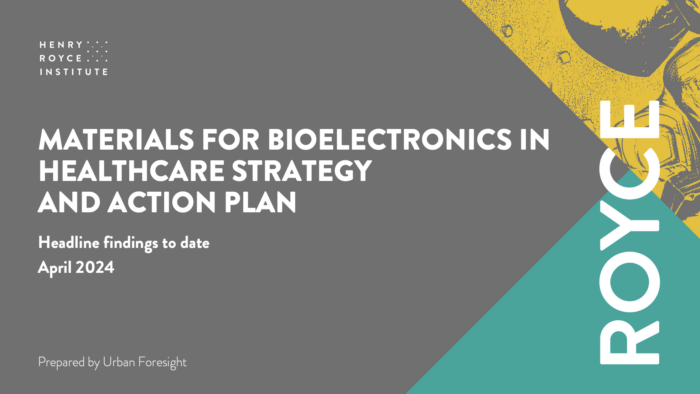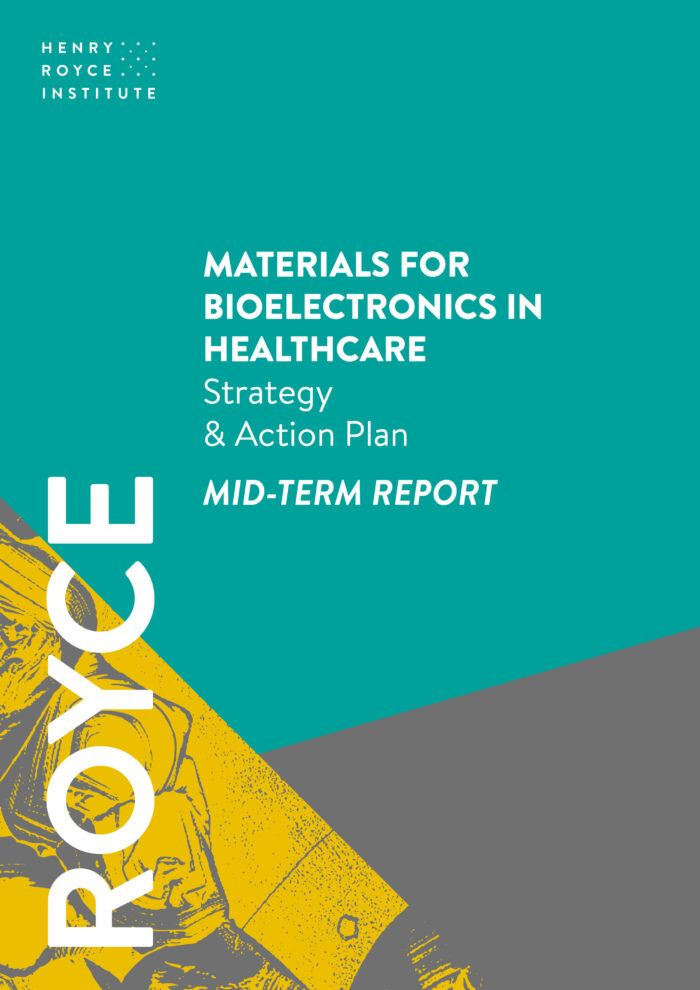This website uses cookies so that we can provide you with the best user experience possible. Cookie information is stored in your browser and performs functions such as recognising you when you return to our website and helping our team to understand which sections of the website you find most interesting and useful.

Materials for Bioelectronics in Healthcare Strategy and Action Plan
Overview
Royce has completed the first phase of the development of a Materials for Bioelectronics in Healthcare Strategy and Action Plan. Such materials are important to the function of electronic systems that directly interface with biological systems for the purposes of prevention, monitoring, diagnosis, and treatment of disease.
This phase one Mid Term Report is a building block in the establishment of a broader Materials for Health Challenge Area. Challenge Areas represent a targeted initiative designed to stimulate and drive UK materials research towards clear outcomes that meet both national and global needs.
Materials will play a key role in supplying safe and responsible healthcare solutions in the future. Royce wants to support materials translation to provide these materials for health and ensure that the UK can capture a share of this emerging global market.
Materials for Bioelectronics is the first focus area and the aim of this process and output is to provide clarity on the current state of research and associated translation, most importantly, where there are gaps, barriers or disruptive opportunities which remain overlooked.
The final Strategy and Action Plan, to be published in June will deliver actionable pathways to building a materials innovation ecosystem that meets the demands of the growing bioelectronics sector in the UK and globally.
This work will be expedited in 3 phases
- Current state research – now complete: download the mid-term summary
- Future Opportunities – sector engagement
- Strategy Delivery – with clear next steps and actions

Context & Challenges
Bioelectronics is a hugely exciting area that builds on the fields of electrical engineering and material science. The field of bioelectronics has captured public attention with some exciting new devices reaching the clinic, such as deep brain stimulation as a treatment for motor dysfunction resulting from Parkinson’s disease, cluster migraine, depression and obesity.
Bioelectronics is also an enabling technology for remote out-patient care. Brain computer interfaces (BCI) are a promising access technology for people with physical disabilities who have limited control over their bodies. BCIs allow you to control an application or a device, via a computer, using only your mind.
Bioelectronics to date have relied heavily on traditional electronic materials, or materials developed for other purposes. However, there is a clear need for new, bespoke materials to be developed specifically for bioelectronic applications, given the challenges of operating in biological environments, potentially in bodies, for long periods of time.
There is strong interest by UK industry in bioelectronics and particular interest from medical device manufacturers. However, as our research shows, the challenge is that there is currently a large gap between existing materials and the next phase of advanced materials. Closing that gap will either require the enhancement of existing materials and associated regulatory approval or the demonstration of the functionality of new materials with associated regulatory approval.
The UK has pockets of activities on bioelectronics, however a major step up in investment is required to attract the best talent and to increase industrial involvement.
Stage 1: Interim Findings
This Mid Term Report tells us that a key UK advantage is its excellence in both materials science and in clinical research, both required for the success of bioelectronics. The Landscaping work shows that:
- The global market size for bioelectronics could reach between £16.2 billion and £28.0 billion by 2030.
- The UK has an active research sector in bioelectronics, producing around 11% of scientific papers published globally in the sector.
- The US and China are responsible for applying for 65% of the total bioelectronic patents in the world. UK provides 2.64% of all bioelectronics patent applications – the highest of any European country.
- This research has so far identified over 700 organisations worldwide with an interest in materials for bioelectronics in healthcare.
- The UK has invested £33.5 million into bioelectronics research between 2006 and 2023.
- The projected market size for the bioelectronics sector in the UK by 2030 could be between £240 million and £298 million.
Stage 2: Sector Consultation
Royce is now seeking to understand the future innovation challenges and opportunities in materials for bioelectronics, and what is needed to support research and translation of material advances into life changing products.
Our Partner Urban Foresight is now running a Materials in Bioelectronics Survey, and will be following up with a number of one to one interviews. The valuable insights gained through this survey and follow-up will be used to inform future innovation strategy for materials developed for and used in bioelectronic healthcare.
Collaborate
Express your interest in participating in round 2 of the Materials for Bioelectronics in Healthcare Strategy and Action Plan



